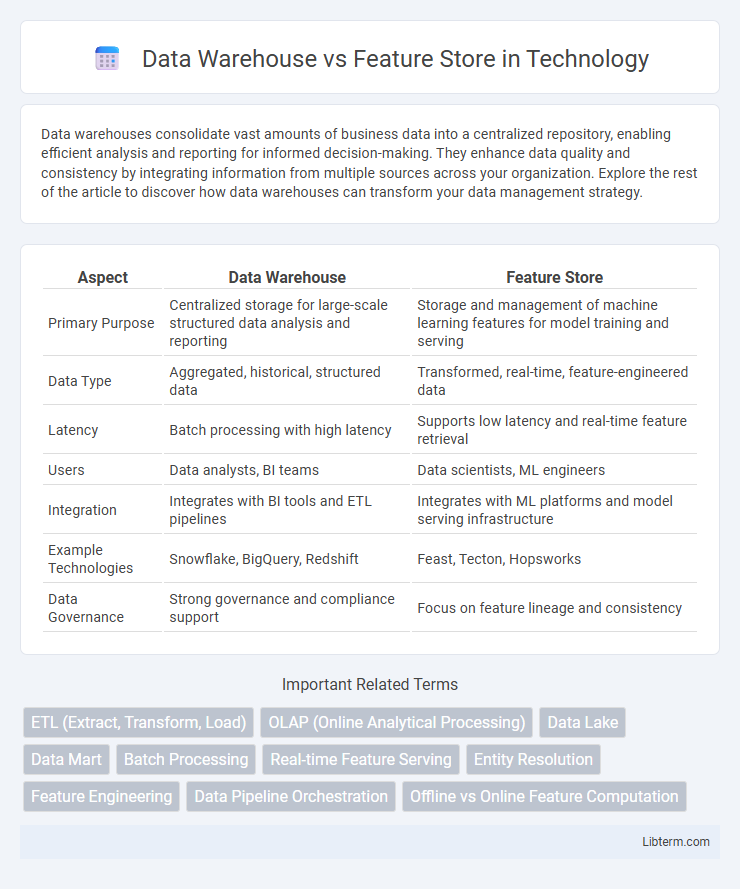Data warehouses consolidate vast amounts of business data into a centralized repository, enabling efficient analysis and reporting for informed decision-making. They enhance data quality and consistency by integrating information from multiple sources across your organization. Explore the rest of the article to discover how data warehouses can transform your data management strategy.
Table of Comparison
| Aspect | Data Warehouse | Feature Store |
|---|---|---|
| Primary Purpose | Centralized storage for large-scale structured data analysis and reporting | Storage and management of machine learning features for model training and serving |
| Data Type | Aggregated, historical, structured data | Transformed, real-time, feature-engineered data |
| Latency | Batch processing with high latency | Supports low latency and real-time feature retrieval |
| Users | Data analysts, BI teams | Data scientists, ML engineers |
| Integration | Integrates with BI tools and ETL pipelines | Integrates with ML platforms and model serving infrastructure |
| Example Technologies | Snowflake, BigQuery, Redshift | Feast, Tecton, Hopsworks |
| Data Governance | Strong governance and compliance support | Focus on feature lineage and consistency |
Introduction to Data Warehouses and Feature Stores
Data warehouses serve as centralized repositories designed to consolidate large volumes of structured data from multiple sources, enabling complex querying and historical analysis for business intelligence. Feature stores, in contrast, are specialized platforms focused on managing, storing, and serving machine learning features, ensuring consistent feature engineering and real-time access during model training and deployment. Both systems play distinct roles in data ecosystems, with data warehouses supporting broad analytical workloads and feature stores optimizing the ML lifecycle through feature reuse and governance.
Core Concepts: What is a Data Warehouse?
A Data Warehouse is a centralized repository designed to store large volumes of structured data from multiple sources, optimized for query and analysis to support business intelligence and decision-making. It consolidates historical data, enabling complex queries, trend analysis, and reporting across diverse datasets. Data Warehouses employ schema designs like star or snowflake schemas to organize data efficiently for fast retrieval and analytical processing.
Core Concepts: What is a Feature Store?
A Feature Store is a centralized repository designed specifically for managing, storing, and serving machine learning features consistently across training and serving environments. Unlike a Data Warehouse that organizes raw and processed data for broad analytical queries, a Feature Store provides feature engineering workflows, versioning, and real-time feature delivery to ensure model consistency and efficiency. Core concepts include feature definitions, transformation logic, metadata management, and online/offline feature retrieval to support scalable ML model development.
Data Storage Architecture Comparison
Data warehouses centralize large volumes of structured data optimized for analytical querying and reporting, utilizing a schema-on-write approach that enforces data models during ingestion. Feature stores, designed specifically for machine learning, store feature data with low latency and versioning support, enabling real-time feature retrieval and consistent training-serving pipelines. Unlike data warehouses, feature stores integrate seamlessly with ML workflows by managing feature transformations, metadata, and access controls tailored for predictive modeling use cases.
Data Ingestion and Processing Differences
Data warehouses ingest structured data through batch processing optimized for complex queries and historical analysis, emphasizing data consistency and integration from multiple sources. Feature stores specialize in real-time or near real-time data ingestion to support machine learning pipelines, enabling low-latency feature retrieval and feature transformations tailored for model training and prediction. Processing in data warehouses centers on ETL workflows for data cleaning and aggregation, while feature stores focus on feature engineering workflows, ensuring features are fresh, versioned, and reproducible for scalable ML deployment.
Feature Engineering and Management Capabilities
Feature stores streamline feature engineering by centralizing reusable feature definitions, transformation logic, and metadata, enabling consistent feature creation across models. Unlike traditional data warehouses that primarily store raw and aggregated data, feature stores provide versioning, lineage tracking, and real-time feature serving to support machine learning workflows. These management capabilities improve feature governance, reduce feature duplication, and accelerate model development cycles.
Use Cases: Analytics vs. Machine Learning
Data warehouses excel in aggregating and storing structured data for complex analytics, business intelligence, and reporting, enabling decision-makers to identify trends, patterns, and key performance indicators. Feature stores streamline machine learning workflows by centralizing, versioning, and serving real-time features, ensuring consistency between training and production environments. While data warehouses support batch processing for historical analysis, feature stores optimize feature engineering and online inference in ML systems, making them essential for scalable AI applications.
Scalability and Performance Considerations
Data warehouses excel in handling large-scale structured data with high query performance, but they often struggle with real-time updates and low-latency access critical for machine learning workflows. Feature stores are designed for scalable feature management, offering efficient storage, retrieval, and consistent feature serving across batch and streaming pipelines, optimizing performance for model training and inference. Scalability in feature stores is enhanced through automated feature engineering, versioning, and feature reuse, reducing redundancy compared to traditional data warehouses.
Integration with Machine Learning Workflows
Data warehouses centralize large volumes of structured data optimized for analytical querying, allowing machine learning workflows to access consistent, historical datasets for training models. Feature stores streamline the management and serving of features by enabling real-time and batch feature retrieval, directly supporting model development, deployment, and monitoring pipelines. Integration with machine learning workflows enhances model accuracy and operational efficiency through automated data versioning, feature transformations, and scalable feature sharing across teams.
Choosing Between Data Warehouse and Feature Store
Choosing between a data warehouse and a feature store depends on the specific needs of data processing and analytics. Data warehouses excel at centralized storage and complex queries on historical data, supporting large-scale business intelligence and reporting. Feature stores streamline machine learning workflows by efficiently managing, serving, and versioning features for real-time model training and inference.
Data Warehouse Infographic

 libterm.com
libterm.com